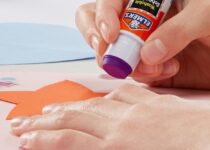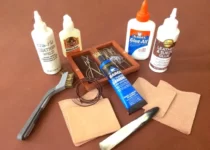How long does it take for epoxy to dry
Before starting let us find out what exactly is epoxy resin? Epoxy resins belongs to the class of polymers and pre polymers. Epoxy resins when reacts with curing agents or hardeners takes the shape of durable or strong substance. The same is used in a number of industrial and commercial applications. If you are working with epoxy resins, always wear gloves and face shields.
A DIY project with unlimited potential is epoxy resin. If you are using epoxy resin for the first time, it can be challenging. The cure Epoxy resin dry durations will vary depending on the kind of resin you use while manufacturing your product, and the manufacturer ought to provide you with that information. The epoxy typically needs up to 72 hours to cure fully.
The resin needs enough time to completely cure before being moved or sanded, regardless of the dry period. Epoxy will be more prone to surface contamination if it isn’t given time to heal fully. Smudging, fish eyes, or an uneven surface could result from this. The glue application is a crucial phase that requires more care than other tasks.

The Quickest Method To Dry Epoxy Resin
Depending on how you utilize your epoxy resin, dry times can vary. However, we have a few suggestions for hastening epoxy dry time.
Purchase a quicker-curing resin.
Buying epoxy resin with a quicker cure time can speed up the drying process. Fast-acting curing agents are crucial to quick-drying resins; many will begin to cure shortly after being poured. However, this procedure is not advised for beginners using epoxy resin because it reduces your working window with your resin and is less forgiving of errors.
Warm up your supplies.
Warming your materials before using them is another way to reduce the drying time for epoxy. Your resin bottles should sit in hot water to the touch for five to ten minutes before you use them. After pouring the epoxy, you can also use appliances like heat guns or hair dryers to apply heat. When employing this technique, apply heat evenly and watch out for cracking and bubbles.
Boost the interior temperature.
Even a slight increase in the room’s temperature can significantly affect how quickly your epoxy cures. Your epoxy glue will dry faster if you use a heat lamp or raise the temperature in the room.
Utilise UV resin
The fastest way to cure resin is under a UV lamp, where UV Resin takes about 2 minutes. Since this specialty item should not be cast in too thick layers since it is a specialty item.
Can I Dry the Resin More Quickly?
You might be curious to learn if the process can be sped up now that you know the answer to the question, “How long does epoxy take to dry?” It can be annoying to wait for the epoxy resin to cure. You can do a few things to speed up the epoxy’s drying process, but you must first read all of the product’s manufacturer instructions before making any attempts.
Before choosing it for your project, you must know the precise curing time of the epoxy you choose. Several products cure quickly, but you must act swiftly when using them. These epoxies have a higher concentration of curing chemicals than other goods. There is no space for error because some may even harden in minutes. Try your hand at the faster cure items if you are sure of your abilities. Learn how to correct your epoxy blunders if you do make a mistake. However, starting right is the wisest course of action.
Increasing the epoxy cure temperature could hasten the process instead of the standard air-drying method. Some people will use a hairdryer or heat gun. It would be best if you used these techniques with caution, though. Adding heat can remove air bubbles, but it can also cause surface fissures.
An excellent approach to speed up the curing process is with heat. You should keep your project in a room heated to a high temperature. In some circumstances, the additional heat can reduce the drying time in half. To add more heat to your home, consider adding a heat lamp.
Looking to cure the epoxy resin? Here Are Few Things To Avoid –
While there are a few tried-and-true methods to speed up the cure of your epoxy resin, there are a few items we advise you to steer clear of in your quest to do so.
Avoid using too many curing agent
Using more curing agents than suggested for your epoxy is not a good idea. By doing this, you can shorten the “pot time” of the resin or the duration during which your epoxy is usable. As a result, the resin can start to set up as you pour it.
Avoid using too much color
You could get poor results using more than 7% color compared to the resin and hardener. know if you can effectively use acrylics on epoxy without any issue in this detailed article written for your better understanding.
Keep Materials Separate
Using a different curing agent than the one included with your epoxy is also not advised because they could not work well together. The mixture cannot cure if you employ a curing agent that doesn’t work with your base.
Use no more than the permitted amount –
Even if you’re still using the correct ratio, we advise against using more of each component than the manufacturer specifies. This may lead to the curing agent overheating, resulting in a mixture that would harden when poured or very soon after.
Factors that may affect your resin-
What are some elements that could be influencing the drying time of your epoxy? Just a handful of the items listed below could impair the way your resin dries without your knowledge.
The temperature
As previously stated, temperature plays a critical role in epoxy drying. The time it takes for epoxy to dry may be impacted by the temperature where you work. Your epoxy will cure more slowly at a cooler-than-normal room temperature.
Utilizing extra hardening agents –
Although it may shorten the drying period of your epoxy, adding any hardening chemicals to your mixture that is not advised by the manufacturer may cause your work to seem murky or yellow. Your epoxy dry time can be readily managed without using any additional agents by utilizing the suitable base-to-curing agent ratio and controlling the temperature in your workplace.

Difficulties with Epoxy Curing
The time it takes for your epoxy to cure can increase under certain conditions. You could unintentionally make a mistake and lengthen the project’s curing process. Another curing agent being added to epoxy is a typical error. Most epoxies have their curing agents; therefore, adding more hardeners to the mixture can result in a mess and take longer to finish your project.
The epoxy resin’s cure time may be prolonged when colored. Ensure the color contributes no more than 7% to the resin and curing agent. Using these measures and a prompt curing procedure, you may maintain the texture you want. Additionally, you should never “mix and match” brands and always stay with one. You might make a mixture that won’t be set using a resin and curing agent from a different manufacturer.
It would help if you also were exact in your calculations of the quantities. Longer cure times can result from adding too much epoxy to your project, which can change the ratio.
Adverse Effects of Divergent Epoxy Resin Curing
- Yellowing might happen if the resin is colored unevenly.
- At times, the surface may be sticky.
- Epoxy resin can become opaque.
- Blushing may occur.
- Uneven surfaces with glossy and non-glossy areas are possible.
- The base’s adhesion may deteriorate.
Hints and Techniques
- When your combination reaches the end of its pot life, it can get too hot to handle; keep an eye on the time to prevent getting burned.
- All the ingredients for your epoxy resin mixture must be at the same temperature. Your resin can have difficulties evenly curing if they aren’t.
- Mixing your resin to dry quickly and cure evenly and carefully is crucial. Make sure your resin is evenly blended with your ratio.
- Have fun using epoxy resin; finishing your DIY projects at home is exciting.
Conclusion
After mixing and pouring, many epoxy resins will be touchably dry in less than 24 hours. The entire cure will take seven days, but as long as you are careful, you can continue working on your project now. If you aren’t delicate enough, it can scrape or dent (not ding). Allow the slow-curing epoxy to set for 48 to 72 hours before touching it.
Resins that cure quickly are a thing. These resins are often polyurethanes, which can cure in minutes to a couple of hours. Fast-curing resins are best suited for experienced resin users. In other words, these resins are only suitable for some users. In general, polyester resins can be handled after 12 hours. Despite the great range in silicone resins, they are typically touchable 24 hours after pouring.

FAQS
How do you determine when epoxy is dry?
When the epoxy starts to gel, or “kick-off,” it enters the first cure phase. By the time the epoxy reaches the firmness of hard rubber, which you can pierce with your fingernail, it is no longer workable and has become sticky and gel-like in consistency.
Does epoxy dry overnight?
Although epoxy takes seven days to cure, your floor may be dry enough to walk on in about 12 hours and prepared for light use in about 24 hours. However, use caution because these deadlines may not apply in all circumstances. The procedure takes longer in a cooler, less humid environment.
Does sunshine assist with epoxy drying?
However, “temperature and sunlight are the major drivers of cure time for most epoxies. The curing time decreases with increasing epoxy mix temperature. Epoxy curing can be controlled by raising the temperature to hasten or lower the reaction.
Is Epoxy waterproof?
Once bonding and curing, epoxy will resist almost any liquid or solid material, including water and humid air. Due to this quality, epoxy is widely used for outdoor table tops, shower walls, and garage floors.
Can epoxy be broken easily?
Epoxy is particularly resistant to deterioration caused by chemicals and the environment, as well as wear, cracking, peeling, corrosion, and abrasion. Epoxy is resistant to moisture once it has dried.

Being associated with art and craft field since decades as a hobbyist and life long learner has given me an opportunity to learn many new things related to art, craft, paints and pottery which i am trying to share with your guys on this website. I have expertise of being professional painter and potter for the last 20+ years
I have learned mind blowing cool tips and insights which makes me a person with ability to improvise and come up with creative ideas and solutions to make stunning and impeccable art pieces of all types which are adored by people across the globe on this website and other platform.


